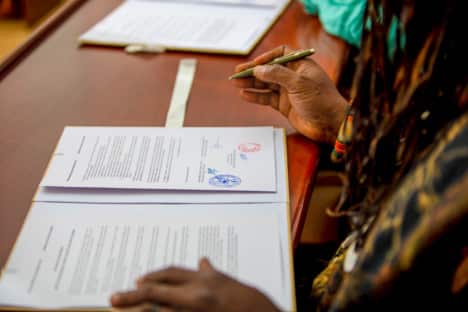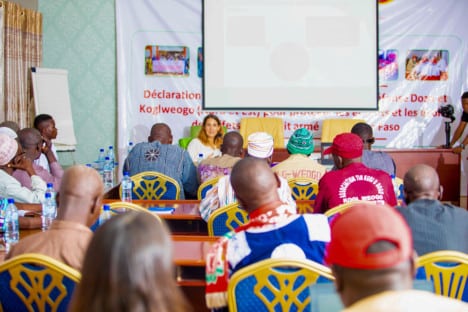Burkina Faso
Thematic areas: Child Protection – Protection of Education – Humanitarian Access – Famine – Forced Displacement – Humanitarian Norms
Burkina Faso has been experiencing a security crisis since 2015, which has gradually spread to several regions of the country, with a considerable impact on the protection of civilian populations. Despite the efforts of the country’s defense and security forces, armed groups remain active in some parts of the territory. Since then, humanitarian access has been progressively restricted, and the humanitarian principles essential to the protection of civilians are increasingly compromised.
The country is also facing political instability, marked by two coups d’état in less than a year (one in January 2022 and the other in September of the same year).
Thanks to a ministerial decree authorizing it to operate, Geneva Call has been active in Burkina since 2021, helping to improve the protection of civilian populations affected by conflict in the North, East, Boucle du Mouhoun, and Sahel regions.
Geneva Call’s activities in the country
The main focus of Geneva Call’s intervention is on humanitarian access, considered as a cross-cutting theme that directly influences and reinforces several priority areas. This comprehensive approach addresses key concerns related to the protection of children and education, the prevention of food insecurity and forced displacement, and gender issues. By prioritizing and improving humanitarian access, Geneva Call seeks to build a more effective and interconnected response.
Geneva Call also addresses social cohesion and the challenges of peace and stability, with a focus on easing tensions between displaced people and host communities. In addition, Geneva Call’s efforts extend to the prevention of community tensions linked to participation in hostilities. This specific aspect is integrated primarily into community engagement initiatives, working closely with local influencers to foster understanding, harmony, and stability within and between communities.
Identification and support of relevant state mechanisms and structures in charge of IHL and IHRL issues.
Advocacy on civilian protection issues with the country’s highest national, regional, and local authorities.
- The Comité Interministériel du Droit International Humanitaire (CIMDH), the Commission Nationale des Droits Humains (CNDH), and the Direction General des Droits Humains (DGDH) benefit from the technical support of Geneva Call on the protection of civilians.
- Thanks to the support of Geneva Call, a pool of 30 trainers has been set up within the above-mentioned structures to train Volunteers for the Defense of the Homeland (Volontaires pour la Défense de la Patrie VDP).
- Training sessions for VDP trainers were carried out thanks to the support of Geneva Call. A total of 180 trainers were equipped to train VDPs.
Identifying and supporting the implementation of local initiatives to protect civilians, strengthen social cohesion, and facilitate humanitarian access.
- Several local initiatives to protect civilians were supported by Geneva Call. These included the production of a radio program hosted by traditional and religious leaders, local advocacy sessions, the setting up and training of Departmental Observatories for the prevention and management of community conflict, etc.
Localizing humanitarian commitment through capacity-building of communities, influential members, and civil society organizations.
- Geneva Call has a partnership with 4 local civil society organizations working in the field of civilian protection. These 4 structures are trained and benefit from support to carry out activities in favor of the protection of civilians.
Humanitarian commitment by self-defense weapon bearers to protect civilians.
- Signing of 3 Unilateral Declarations on child protection and education with various armed groups and de facto authorities (GAAD) in the East, North, and Boucle du Mouhoun regions. These declarations led to a series of measures to protect children and schools in these regions.
- Organization of 32 training sessions and roundtables with self-defense weapon bearers, focusing on international humanitarian standards relating to child protection, the protection of education, the basic rules of the combatant, and the prevention of famine.
- The Dozo and Kogleweogo have raised the minimum age of their fighters to 18. This commitment has facilitated the release of some abducted NGO staff.
Key figures
An estimated 2 million people are internally displaced, 58% of them children.
More than 179,000 malnourished children are in need of life-saving assistance.
More than 100 religious and community leaders took part in training sessions to advocate the protection of civilians to the authorities and GAADs.
900 books distributed to self-defense weapon bearers.
210 members of armed self-defense groups trained in the importance of child protection and education, preventing famine and conflict-related food insecurity, and facilitating access to humanitarian aid.
2 million people reached by radio campaigns
Contact information:
Moussa Ag Waerzaren – INTERIM COUNTRY DIRECTOR
mwaerzaren@genevacall.org

